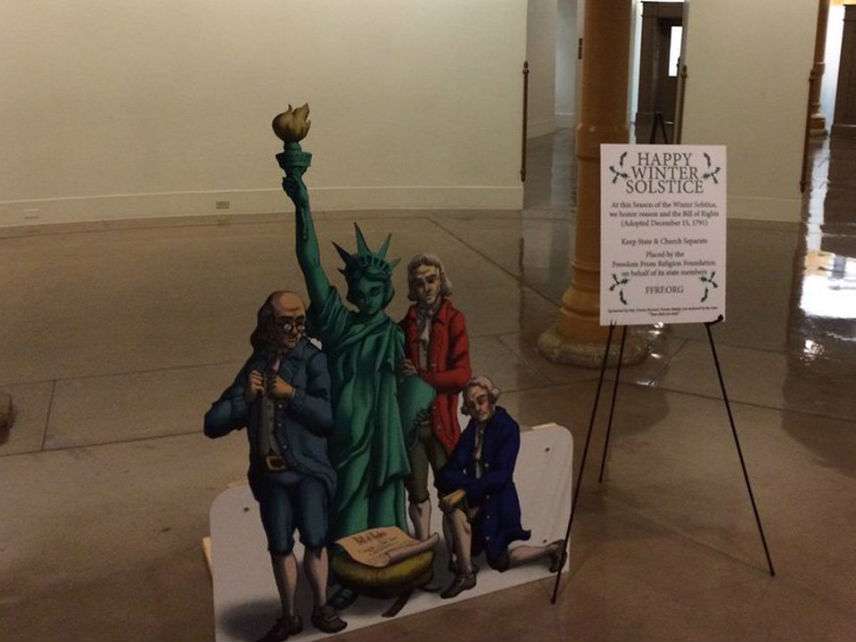Tis The Season for Christmas Lawsuits
Whether you've been naughty or nice.
Christmas is supposed to be a time of peace on earth and good will to men people, but in the U.S. it's also a time of legal battles. And if those fights often stem from ginned-up outrages, they still sometimes involve important constitutional principles. Here are some current and recent examples:

1. A Catholic archdiocese sues to advertise on DC buses.
The Washington Metropolitan Area Transit Authority (WMATA) refuses to post the Archdiocese of Washington's advertisement for a Christmas website. The ad features three shepherds and a couple of sheep under a cluster of stars; the agency ruled that this violates a 2015 policy against "issue-oriented advertising, including political, religious and advocacy advertising."
So the archdiocese is suing. According to the lawsuit, the third-party vendor that handles WMATA's advertising space said the ad, which it was seeking to place on the sides of buses, wouldn't pass muster unless it could sell some good or service, something the archdiocese said it obviously couldn't do.
The 2015 policy was put in place after anti-Islam activist Pam Geller tried to place an ad with a cartoon of the Muslim prophet Mohammed.
The lawsuit is the second over the policy this year. The American Civil Liberties Union (ACLU) filed suit on behalf of itself, the abortion provider Carafem, People for the Ethical Treatment of Animals, and the right-wing provocateur Milo Yiannopoulos, all of whom had ads rejected by the WMATA.
The ACLU ad featured the First Amendment.
2. A Texas governor removes a "mock" nativity.

Two years ago, the Freedom from Religion Foundation (FFRF) placed a holiday display in the basement of the Texas state capitol. It featured a nativity scene with the religious figures replaced by the Statue of Liberty, three founding fathers, and the Constitution in place of the baby Jesus.
Republican Gov. Greg Abbott had the display removed, calling it a "juvenile display" and insisting the Constitution didn't require Texas "to allow displays in its Capitol that violate general standards of decency and intentionally disrespect the beliefs and values of many of our fellow Texans."
Abbott's juvenile display, which a judge ruled in October violated the FFRF's first amendment rights and constituted "viewpoint discrimination in a limited public forum," illustrates what a poor steward of free speech government can be, and why its role in policing, approving, or authorizing speech ought to be limited.
The organization, which advocates for the separation of church and state, said it would prefer no displays.
"We'd rather keep divisive religious—and irreligious—views out of state capitols," the group's co-president said after the ruling. "But if the government creates public forums, and permits Christian nativities in them, there must be room at the inn for the rest of us."
3. A town harasses the creator of a zombie nativity scene.

Jasen Dixon's zombie nativity scene went up in front of his home in Sycamore, Ohio, last week for its fourth and final year.
Dixon tells the Cincinnati Enquirer he wasn't going to do it this year, but he changed his mind after he got a lot of inquiries about it. He says he wants to sell it or put it in storage.
The town initially fought Dixon over the display on his private property. Last year he faced 27 misdemeanor charges and $13,500 in fines after the town claimed the nativity's roof violated zoning ordinances. The charges were eventually dropped.
This year the town's zoning administrator says that fighting the display isn't worth the cost. But Dixon has an attorney ready if officials change their minds.
"A lot of people have looked at this case as a humorous story, but there is a fundamental principle at stake," Dixon's lawyer, Rob Linneman, said after the charges against his client were dropped. "The real importance of the First Amendment is that it protects unconventional and unpopular viewpoints from persecution."
4. A man gets fired for…posing as Santa Claus while holding a gun?

A Michigan man is suing his former employer, the state Department of Health and Human Services. His managers, he claims, retaliated against him for posting a photo to Facebook of himself in front of his Christmas tree dressed as Santa Claus and holding an unloaded and legally purchased rifle.
Calvin Congden, a veteran of the war in Afghanistan, alleges that one of his managers then warned co-workers about him, claiming he "looked crazy" and was a firearm-owning veteran.
After Congden complained about the comments, he says, his managers spent the next nine months writing him up for minutiae and finally fired him.
"The real motivation for plaintiff's…termination was retaliation for his exercise of his constitutionally protected right to bear arms, his constitutionally protected speech, and his disability," his lawsuit claims.


Show Comments (12)